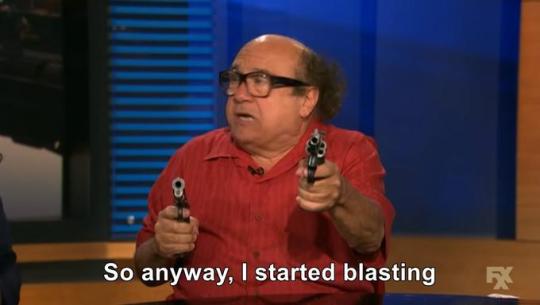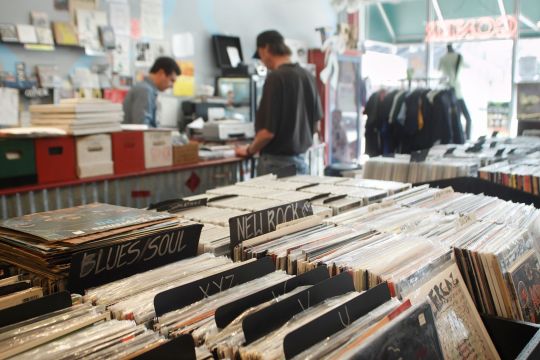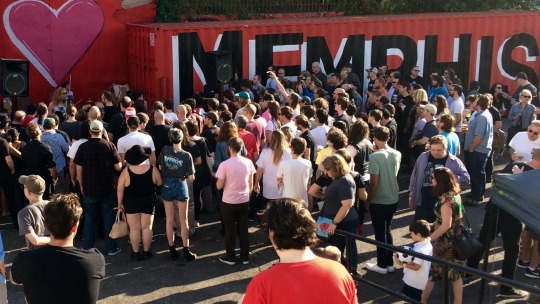#those fleisher cartoons man
Text
Silver Age Lois Lane: Oh dear, my feminine obsession with marriage has gotten me into humiliating danger!
Golden Age Lois Lane:

304 notes
·
View notes
Text
Eric Friedl/Goner Records Update

Photo by Don Perry
Alongside Zac Ives, Eric Friedl is the co-owner of Goner Records. He also plays in The Oblivians and True Sons of Thunder.
Located in Memphis, Tennessee, Goner operates as both a record label and storefront. Like Shangri-La, Goner Records has been a Memphis institution since the storefront’s opening in 2004. Every year, Goner hosts Gonerfest—a still-vibrant music festival stretching several days. For those outside of Memphis, Goner’s frequently updated online store is a hub for what’s new in esoteric music. The site’s message board is a place to get updates on touring bands, small labels’ releases and anything else music related.
Like countless small businesses, Goner has been impacted by the COVID-19 pandemic. The storefront has been closed since March 16. I caught up with Friedl to talk about how Goner’s coping with these changes and what their plans are for the future. Goner is and hopefully will remain an important part of independent music’s infrastructure.
Interview by Ryan Leach
Ryan: How’s everyone at Goner doing?
Eric: We’re good. But like everyone, we’ve fallen into a freefall. Locally, we’ve been doing door deliveries. People have been stopping by to pick up records. We’ve had some success selling online. If we really scale back and don’t spend anything for a minute, we can hang on for a little while. We might have to lay off our staff; have folks go on unemployment. Goner would be reduced to just me and Zac (Ives) as the owners. We could limp through it that way. We’re trying to figure it out.
Ryan: Like most small businesses in America, Goner’s storefront is closed. How are these alternative strategies like doing door deliveries and having folks stop by to pick up records working?
Eric: One of our regulars just can’t stop buying records. He’ll call me up in the morning—I guess he’s unaccustomed to looking at the site—and I’ll tell him what’s come in. He’ll respond, “Oh, man, I’ve got to get that album.” We then pack his records and he comes by to grab them. We’ve delivered a few records off locally. It’s super informal. But every little bit counts. People have been helping out. It’s been great.
Ryan: You had mentioned to me a couple of months ago that you were going to relaunch the Goner website. While the COVID-19 pandemic and economic meltdown have been an unmitigated disaster, it was at least fortuitous timing.
Eric: We were getting ready to launch the site when the coronavirus hit. We wanted to fine-tune it a little more and add some things. But once it became imperative that we be able to sell stuff online, we said, “Screw it. Here it is. We’ll fix it as we go.”
Ryan: I went to buy the Aquarium Blood LP you had recently released and it took me to a Bandcamp site initially.
Eric: (laughs) It really is a matter of working out the kinks as we go.
Ryan: While everyone’s situation has changed, in some ways Goner wasn’t a case of just punching a timeclock. Record stores are hubs and hangouts for people. When Trailer Space closed down in Austin, it was a significant loss.
Eric: It is weird. We definitely weren’t a Trailer Space-style of hangout, but people on their regular circuit would stop by and explore the used bin. On weekends, we had a big crew of normal folks buying classic rock albums. There’s absolutely no way to sell that stuff online. We were stocked for those folks and that side of the business completely died. We had a bunch of really cool events coming up. You feel like you’re right in the middle of things and then you’re isolated. That was sort of my idea with doing these video check-ins. I sent out requests for people to give us video updates. I want to show people that we’re still in this. Facebook just makes us feel like we’re on our own little islands, which we really are now. We’re isolated from one another. It doesn’t have that sense of community that you can get from other places online. We’re just hoping to keep people’s spirits up as we go forward into the unknown.
Ryan: That’s a good point. Used bins are the home of the “five-dollar record,” although I’m unsure what people are selling them for now. You’re not going to sell used copies of David Bowie’s Ziggy Stardust and the Spiders from Mars or a Led Zeppelin record online. They’re so ubiquitous that it doesn’t make much sense. However, they’re perfect for a store.
Eric: Sure. People would walk in and buy’em. We’ve had people call up and ask, “Do you have this Allman Brothers record? You do. Great, I’ll pick it up.” They can buy it on eBay. They can buy it on Discogs. But because they live locally, they can stop by the shop, purchase it, and listen to it this afternoon. It still works. The store sold a lot of meat-and-potatoes rock ‘n’ roll records. We needed that balance between selling weird, underground rock records and classic rock albums.
Ryan: Byrds, Bread and Toto records all at the same place without the shipping price and wait.
Eric: It’s awesome. There is a little bit of that at the store. Speaking of which, if anyone out there is looking for a Sister Sledge record, we’ve got it! Call us up.
Ryan: Talking about the atomization associated with Facebook—I think of the site’s sort of opposites. Terminal Boredom’s message board was a great place for likeminded people to share ideas about music. The Goner message board, which has been revamped, was a predecessor of sorts to Terminal’s board.
Eric: Yeah. Even for me, it’s frustrating to use the Goner board. It’s such a dinosaur. It kept chugging along for years. We need to tweak it and make it more functional. It’s hard to envision people staying on it now like they used to. But it is there, and it was a big hub for people who were into underground stuff. Terminal Boredom was too. I always felt comfortable reading that stuff up until a point. The squabbles got to be a bit much and I’d lose track of what was going on. Anyway, check out the Goner board!
Ryan: For bedroom record labels like ours (Spacecase), you could sell 15 titles almost right away by going on those boards. And you didn’t need to pay a public relations company a couple grand to do it.
Eric: You were getting your records in front of the right people.

Eric Friedl photo by Mor Fleisher-Leach
Ryan: Beyond COVID-19 and the global economic meltdown, in our milieu we had Apollo Masters burn down a couple months ago. I use Musicol out in Columbus, Ohio, and I know they’re going to be closed for at least a few weeks. Did the Goner label have anything in the works that’s been put on hold?
Eric: The Bloodshot Bill record is done and is supposed to come out on April 10. We’ve got those shipping soon. We did the preorders on that album, so it is in motion—if you get what I mean. We had this Optic Sink record in the works. Optic Sink is Natalie (Hoffmann) from Nots and Ben Bauermeister from the Magic Kids. It’s really cool, electronic stuff. That’s at the digitally mastered stage. The Ar-Kaics record is up there. So is the new Quintron record. We have a choice of getting these lacquers cut and then wait to press. Or we can try to hang tight and wait. I think we’re going to have to wait to minimize expenses right now. They’re all there. I think once we get through this it’s going to be a clusterfuck of people trying to rush through records. But who really knows what’s going to happen? There are all these Record Store Day LPs that supposedly got pressed or are getting pressed.
Ryan: I read that Record Store Day’s date has been pushed back to June 20, 2020. That might be a little optimistic.
Eric: Yeah. It’ll be interesting. It’s another nail in the coffin for trying to sell records. We’re limping along. If we can get our weekend regulars in to pick up records, that’ll help. But this shutdown is going to put a lot of people—obviously, record stores included—out of business. Labels are going to be in trouble too. If you’ve got records scheduled for a Record Store Day release in mid-April, that’s done. That money isn’t coming back until Record Store Day finally happens. The market was already shrinking before all of this hit.
Ryan: You’re still getting new stuff in. Goner’s site is getting updated regularly. What new records have you been listening to?
Eric: We’re trying. It’s going to be hard justifying it going forward. We were really excited to get that Dadamah record (This is Not a Dream) in. I remember it coming out in the early 1990s. That kind of dreamy, New Zealand stuff is what we want to push. However, the hard part is that everyone into that subgenre already knows about it. It’s difficult to get new people into it. We did that Chubby and the Gang record (“All Along the Uxbridge Road” 7”). That was a street punk-type of chugger. We sold a bunch of records for them. Alec (McIntyre) and Cole (Wheeler) at the shop were really into it. So, we gave it a shot. That’s been interesting—getting into the American Oi!-type stuff. We were trying to put some more of that material out when everything ground to a halt. It’s not really my scene, but it’s been interesting weeding through all of this stuff and going, “Oh, yeah, this is pretty good.” Currently, I’ve been trying to find music for the kids at home that they’ll find palatable. They’re playing really crappy stuff. It’s a constant battle. They like songs from cartoons.
Ryan: I bought that recent Exek record (Some Beautiful Species Left) off the Goner site. It was great. It had a real Neu! and Tuxedomoon feel to it.
Eric: That’s a great record. I appreciate that.
Ryan: It’ll be difficult getting inventory. Just thinking about it now—Revolver (Distribution) is closed for at least another couple of weeks.
Eric: Yep. Because all of the distributors and stores are closing, it drives the people who want those records straight to the labels. It’s bad for the stores, good for the labels. We’re a store and a label, so we kind of benefit. But it takes away from having a centralized place to buy records. Which is fine, but it’s something else to worry about down the line.
Ryan: I always looked at our (Spacecase’s) relationship with Goner as symbiotic. I always knew you were going to buy our releases. The Goner store has enabled us to kick the can down the road for a couple extra years.
Eric: For sure.
Ryan: Any closing thoughts, Eric?
Eric: We’re just another small business caught up in total economic collapse. We’re lucky in the sense that we have a pretty loyal customer base. It’s awesome. But in the end we’re very vulnerable. We have to make tough decisions on how to move forward and keep it going. We’ve always had to do that. It’s just that right now it’s so dramatic. You screw up, you’re done. It’s really heavy. At the same time, we’re not going down without a fight. We’ll see what models develop. If we can get through this—if it’s not too long—we’ll make it. If not, everyone’s going to get wiped out. But we’ll see.
Website: goner-records.com

Gonerfest photo courtesy of Eric Friedl
3 notes
·
View notes
Video
youtube
Bendy in "Snow Sillies - A Joey Drew Short
Hmm, boy does this make me wonder. On one front, this with the other shorts gives a very interesting idea of a reason that Bendy went so wrong upon coming off the page. If he’s been continually cheated by outside circumstances then finds out who made those circumstances happen, and made it so that he cannot win in any endeavor, then it does sort of make this seem like a ‘how Bendy became the game’s villain’ cataloge. He’s fed up, he’s tired of continually being pushed down and through crazy circumstances he gets to meet at least one of the people that brought him to life and put him through these events time and time again. And, given Joey’s attitude towards everyone in the studio, can’t say he really had much of a chance in getting anything rectified. And, given that all we’ve heard is that Henry was one of the animators who worked on the episodes, and who may have made Bendy depending on how you interpret the lore, it might make him culpable in Bendy’s eyes as well, not helped by the fact that for whatever reason, Henry left, leaving the studio and its creations in Joey’s care.
Another thought, slightly more meta, is what if this, along with the other shorts, is a cry for help? I have seen at least one theory floating around that Bendy in the Tombstone Picnic short is supposed to represent Henry, but what if that’s somewhat true for all of the shorts? Keep in mind, Henry is in a studio in which he’s continually bogged down by both the volume of work, and feels that he’s pulling a lot of the weight whereas Joey isn’t really helping, and he’s being kept from seeing friends and family by it all. Not to mention, there’s no listing of Henry’s name anywhere; Joey is taking credit for his work. In that sense, perhaps Bendy’s continually being thwarted at getting things he wants is supposed to represent Henry feeling trapped by his circumstances and being kept from what he feels he is owed; recognition and maybe some stability regarding his work.
At the same time, it also seems rather odd that Joey would be so fond of Bendy and put him through all of these circumstances. Bendy here is hardly some big trickster or con man. If anything he’s a little more like a small child in terms of character; he does things seemingly more for the fun of it. Then again, perhaps when it says ‘written and directed by Joey Drew’, the script could be something that someone else, maybe Henry, wrote and Joey just slapped his name on it. Could also be why it has such an ill-fitting name, I wouldn’t exactly be calling anything that happens in this short ‘silly’ to say the least as it doesn’t seem meant to make you laugh. Unless of course you think the circumstances are humorous in a darkly comedic way, but back to the point...what if this is Joey lamenting something that he feels is being kept from him? In nearly all three shorts Bendy has a want, as is central with writing scripts, but he never seems to get it, as its sometimes taken by Boris or in this case circumstances beyond his control. Is this something that Joey feels is happening to him? As I said before, it seems rather odd that he’d be putting Bendy on a pedestal and worship him and then having the little devil be the losing party in the shorts. Unless Joey was trying to say something by putting Bendy in these circumstances time and time again. Granted, we’ve only seen about three shorts so far, but this does seem to be a common thread. Fleisher Studios does kind of dark and gritty, Disney has whimsical motion pictures and sometimes dark animation, Looney Tunes has zany and clever slapstick, and in Joey Drew Studios Bendy can never get what he wants.
To be honest, writing it all out makes me think that it could be one of these possibilities or a mix of all three. Somebody used the Bendy cartoons as a venting tool and as a result Bendy came out with all of the issues that likely came with his circumstances. A lot of this is the English Major in me coming out, but it would be interesting if theMeatly is trying to use these to make a bigger statement regarding either game lore or character traits/history.
At any rate, happy holidays everyone!
#video#bendy and the ink machine#thoughts#bendy#henry#joey drew#and i definitely didn't need this to inspire#another ups and downs short story#but that's what we're left with#just need to finish zango's short story first#theories#perspective#things to think on#just kind of me rambling a bunch
25 notes
·
View notes
Text
Walt Disney
Prepare for an information dump. (recommended to have a beverage on standby because if your determined to read this you are going to need it)
Walter Elias Disney is the most famous person in association with animation, so much so that his name has practically become synonymous with animation. Not only did he elevate animation into a viable industry but he is also why animation has become synonymous with childhood and youth. This in turn has caused a lot of misconceptions about Disney and animation so prepare for some Myth-Busting. For starters he wasn’t even good at drawing.
Walt Disney did NOT invent: animation itself OR the animated cartoon (Charlie Bowers, Winsor McCay and Max Fleisher were doing those before Disney) OR cinematic anthropomorphism (that means things or animals given human qualities, Ladislaw Stareowicz did that before Disney too) OR the first ‘talkie’ (sound synchronized with animation, Max Fleisher again) OR the first animated feature (Lotte Reiniger has the earliest copy) OR Mikey Mouse’s name or design (it was designed by another animator and his wife suggested Mickey instead of Mortimer)
I hope I didn’t just destroy you’re childhood so now I will talk about what he DID do. Walter Elias Disney’s ancestors were from Ireland and when they moved to Canada and then to Chicago, Walt was born on the 5th of December 1901. They didn’t stay there long because when he was 5 they moved to Marceline (I sure hope I’m spelling these names correctly) in Missouri, which is just outside of Kansas City (which actually isn’t in Kansas) but they soon moved into Kansas City itself. Walt loved to wave to the train-drivers as they went past. At school he met another boy with the same name of German decent and they started to reenact plays they saw from vanderville to their classmate. Between them they could reproduce 4 plays and this is what introduced Disney to the theater.
They later moved back to Chicago and despite being unhappy about it Disney was encouraged to take art classes and in high-school he drew patriotic cartoons for the school newspaper. When he was 16 he went to join the army but was a few days late to get recruited, so after telling his mother she forged his birth certificate to make him look older than he was. When he went back they decided to send him to France with the Medical Corp. , specifically the Red Cross. He spent a year there before being discharged, a year of driving ambulances and drawing on them. Yes he got away with drawing on ambulances.
He returned to Kansas City and stayed with his older brother, Roy, who worked at a bank. After weeks of Roy asking clients if they had a job for his brother, Walt finally got a job at a company that made cartoon advertisements. There he met and became good friends with Dutch man called Ubbe Iwerks (later called Ub) who was an amazing animator and illustrator. Where Walt talked a lot with barely any work to show for it, Ub could do 700 illustrations a day but was very quiet.
However Disney eventually got fired because he wasn’t that good an illustrator, so in 1920, at age 19, he and Ub created a company called ‘Iwerks-Disney Commercial Artists’, but this didn’t really work because they were considered too young and inexperienced by the other companies. This company was soon taken over by George Winkler & Charles Mintz who financed their company for a while, long enough to create Oswald the Lucky Rabbit, before pulling the plug and keeping the character rights.
Disney then decided to go to Hollywood and start a studio there, but that didn’t work so his uncle Robert gave him his garage so he could continue to work in there. Walt and Ub collaborated and continued to work on some new characters and after four years of hard work he was lucky enough to receive a contract worth $250′000. He had gone back to Winkler and Mintz for money but they both said no, however on his way out he ran into a friend, Mintz’s sister who was also Winkler’s wife, she saw his characters and wrote the check for him. How lucky is that?
When he sent a message to his brother Roy, who had moved to Los Angeles, he found out his brother was in the veterans hospital with tuberculosis in the isolation ward. I am amazed at what his brother did when he found out that Walt got the money. He escaped from the hospital. Escaped, from a veterans hospital. Now that is what I call a dedicated banker. His brother gave Walt financial and business advice, and they formed the Disney Brothers Studios. After telling his friends who worked in the advertisement company in Kansas City, they came to work for him and they created the ‘Alice Comedy’ series. In 1925 he married Lillian Bounds, an inker who worked for him (at the time women weren’t allowed to animate but instead became inkers, they put the coloured ink on the drawings)
in 1928 he went to New York to ask Winkler & Mintz for more money to expand the studio. big mistake because they essentially fired Disney and stole his work because it was with their money. The company, the characters, the workers, the rights. The characters were not recovered until 2006, and I find it ironic that now Disney now seems to own many other companies and rights like Pixar, Star Wars, and Marvel.
When he created a rodent character that was to become the central character and iconic figure, Walt told his wife Lillian. Mortimer Mouse. I can only imagine she gave him a look that said ‘seriously?’. What I do know is that she proceeded to explain the french word for ‘death’ was ‘Mort’ and that it had too many syllables to say quickly. She was the one who suggested that he be called ‘Mickey Mouse’ and another animator designed the beloved character.
He started the company now known as Disney and it grew into the globally recognized company it is today. He passed away soon after his 65th birthday (from cancer, he was a chain-smoker, it was cool in that era). Disney was a master storyteller and producer, which is why he was such a giant in the animation and film-making world.
(If you read the whole way through this essay-like rambling, thank you for bearing with me. Treat yourself to a biscuit or cookie, you deserve it.)
0 notes